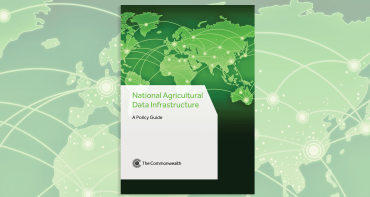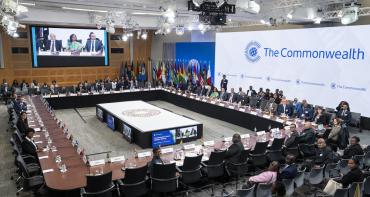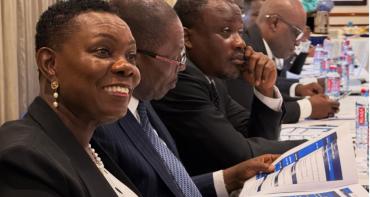A Commonwealth proposal to create a Blue Charter of principles for sustainable ocean development has been greeted with the enthusiastic support of governments and partners at this week’s UN Ocean Conference.

A Commonwealth proposal to create a Blue Charter of principles for sustainable ocean development has been greeted with the enthusiastic support of governments and partners at this week’s UN Ocean Conference.
Secretary-General Patricia Scotland put forward the initiative as a way of helping Commonwealth member governments to “ensure maritime industries are managed in a way that preserves and promotes ocean health”.
The Blue Charter would apply to ocean governance the 16 principles and values of the Commonwealth Charter, including environmental protection, good governance, justice and peace, human rights and gender equality, and recognition of the needs of vulnerable nations and young people.
“Sustainability and development through mutual support and towards shared goals are at the heart of all Commonwealth cooperation and connection, and the ocean is the truly matchless symbol and reality of our global togetherness,” said Secretary-General Scotland.
“The Blue Charter will help countries develop an integrated approach to the building of the blue economy, one which considers the value of often overlooked sectors such as artisanal fishing as well as the role of women and young people. It will help policy-makers to adopt a regenerative model of development and find common sense solutions to challenges such as marine pollution, illegal, unregulated and unreported fishing, and harmful trade subsidies,” she said.
The charter will help support countries to deliver the Sustainable Development Goals in particular Goal 14 to conserve and sustainably use the seas. To give it practical effect, a knowledge and innovation hub and series of best practice toolkits will be developed, complementing the existing support provided by the Commonwealth Secretariat to its 45 coastal member countries.
Welcoming the emphasis on maximising innovation and developing partnerships to promote the blue economy, Prime Minister of Fiji J.V. Bainimarama, the co-chair of the conference, said he supported the initiative. “We certainly look forward to the proposal on the development of the Blue Charter, a set of guiding principles for sustainable, fair and equitable economic development of our ocean space.”
“The wonderful thing about the Commonwealth is the strength and emphasis on sharing experiences and learning from each other,” he added.
.@FijiPM at #BlueCommonwealth event: '@PScotlandCSG hails from a #SIDS in the #Caribbean is a living embodiment of the leadership of #women' pic.twitter.com/SWRqurPi3b
— The Commonwealth (@commonwealthsec) June 8, 2017
Vincent Meriton, Vice President of Seychelles and co-host of the Blue Commonwealth side event, led a round of applause for the Commonwealth as he highlighted the support provided to Seychelles in crafting its national blue economy roadmap. “Since we embarked on this journey in 2014 we have had the benefit of the support of the Commonwealth,” he said.
“Our blue economy roadmap is for the long-term. It sets out strategic priorities and establishes the necessary enabling environment to facilitate transformative change, good governance, private sector engagement, knowledge innovation, investment, monitoring and evaluation.
“Our goals are economic diversification, job opportunities, shared prosperity, food security and most importantly the protection and sustainable use of our marine and coastal environment. Our approach is ambitious. It is about a paradigm shift on how we manage and use our coastal and ocean resources and how we work together.”
Prime Minister of Grenada Keith Mitchell, one of the high level speakers at the Commonwealth side event, said he backed the Blue Charter proposal, noting that his country’s economy is increasingly reliant on coastal tourism. Factors beyond the control of many small island states including global trade shocks and climate change mean they are in need of support, he said.
Thanks #Commonwealth for hosting this most successful event https://t.co/8y2nCQDZa4
— Mukhisa Kituyi (@UNCTADKituyi) June 6, 2017
Semisi Fakahau, Minister of Fisheries, Tonga’s Minister of Fisheries, said, “The proposed idea of the Commonwealth Blue Charter is very timely and relevant and Tonga is very much interested in engaging in its development.” It should recognise the special vulnerabilities of small island developing states and the impact of climate change, he added.
Nicos Kouyialis, Cyprus’ Minister of Agriculture, Rural Development and Environment, backed the proposal saying, “The economies and wellbeing of our countries depend on the healthy marine environment. It is our obligation to protect our oceans and to promote blue growth and the blue economy.
“The benefit of this Blue Charter is that Commonwealth countries can have a common platform of cooperating, exchanging ideas and best practices and joining forces to take action to promote the blue economy and protect our oceans.”
Khurshed Alam, Secretary of Bangladesh’s Maritime Affairs Unit said: “The seas need to be exploited sustainably [for which countries] need capacity, technology and resources. This is where we think the Blue Charter will be a game changer for the Commonwealth and that’s why I congratulate the Secretary-General.”
Find out more: thecommonwealth.org/oceanconference



